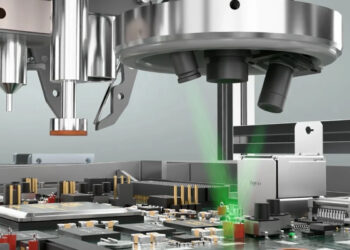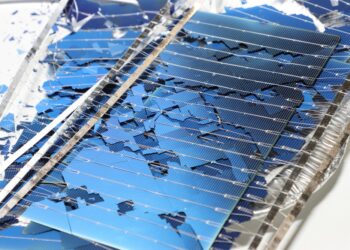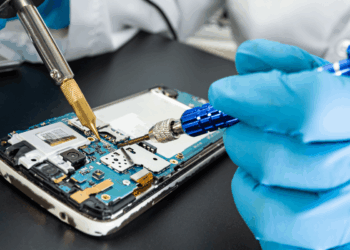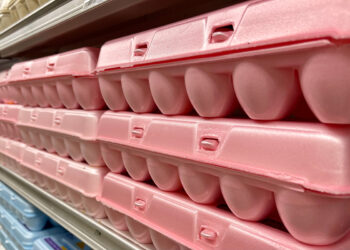Scott Vander Kooy, president of Comprenew, signs a contract with Goodwill of Northern Wisconsin and Upper Michigan in late March.
A nonprofit e-scrap processor’s expansion into the Upper Peninsula of Michigan provides a case study in how service area reach can be widened without incurring major capital costs.
Grand Rapids, Mich.-based Comprenew recently announced its expansion into the broad but relatively sparsely populated Upper Peninsula. The nonprofit company partnered with Goodwill of Northern Wisconsin and Upper Michigan (Goodwill NWUM) for the expansion.
The partnership is allowing Comprenew to leverage existing Goodwill infrastructure, reducing time and costs. Goodwill NWUM has six stores, two training centers and a collection fleet.
“Part of the reason we’re doing this is this is a way for us to serve a much larger territory that has some built-in logistical challenges in a very cost-effective way, thereby minimizing as much as possible our upfront expansion costs,” Comprenew President Scott Vander Kooy told E-Scrap News. “That’s the beauty of putting the time and effort into developing a partnership that ends up operating as one team.”
Reuse-focused enterprise
Founded by Vander Kooy in 1986 as a for-profit refurbisher of IBM mainframe equipment, Comprenew today is a nonprofit organization providing data destruction, refurbishment, repair, resale, and recycling services for a variety of devices. Certified to both e-Stewards and R2, Comprenew provides job readiness and employment for adults with disabilities and other barriers to employment. It also works to bridge the digital divide by providing refurbished equipment to low-income people.
Comprenew handles about 6 million pounds per year. By weight, about 30 percent of what it takes in ultimately heads to reuse markets, with the rest going to commodities recovery, Vander Kooy said. By units, about 38 percent goes to reuse. The organization joined e-Stewards’ new Digital Equity Program.
None of the remarketable equipment is sold to wholesaler buyers; instead, Comprenew is vertically integrated, selling equipment to consumers online and through its three retail stores.
Currently, the company collects used electronics from across the Lower Peninsula of Michigan, with some quantities hauled in from northern Indiana and Ohio and the Chicagoland area.
“We have the Lower Peninsula very well covered,” he said. “Having Comprenew sites across the state has always been part of our strategic plan.”
Finding a partner
The Upper Peninsula, referred to as UP by Michiganders, presents logistical challenges for e-scrap collections: More than 300,000 people are spread across a wide area, separated from the rest of the state by one, eight-mile-long bridge. The largest town is Marquette, population 21,000.
The challenges led Comprenew to open up to the possibility of “partnering with a like-minded organization.”
Goodwill NWUM first contacted Comprenew in December 2016 about a potential partnership, and representatives of the two social enterprises, which both serve individuals facing employment barriers, first met in January 2017. Over the course of 2017, they forged an alliance.
In fall 2017, the first devices were collected at Goodwill locations for delivery to Comprenew. A couple of weeks ago, a new division of Comprenew called Comprenew Northern Wisconsin and Upper Michigan was formed.
Moving on UP
Expansion will occur in three phases. The first involves collecting scrap electronics in the UP for transportation to a Lower Peninsula processing site. To date, most of the collection has occurred at Goodwill locations. The plan is to incorporate a Comprenew department, where collections and sales may both occur, into one Goodwill store per quarter, Vander Kooy said.
Phase 2 will involve buying or leasing a 15,000-square-foot space near Marquette for a Comprenew refurbishment and data security center, he said. Employing about 35 people, that facility will reduce the costs of shipping devices to the Lower Peninsula, although equipment bound for disassembly and recycling will still be sent southward. The center is expected to open later this year, Vander Kooy said.
Phase 3 involves installing one or more electronics disassembly facilities in the UP by 2020. That phase would likely employ another 35 people.
Vander Kooy estimates that that the first year of UP collections will bring in an additional 1 million pounds of material.






















